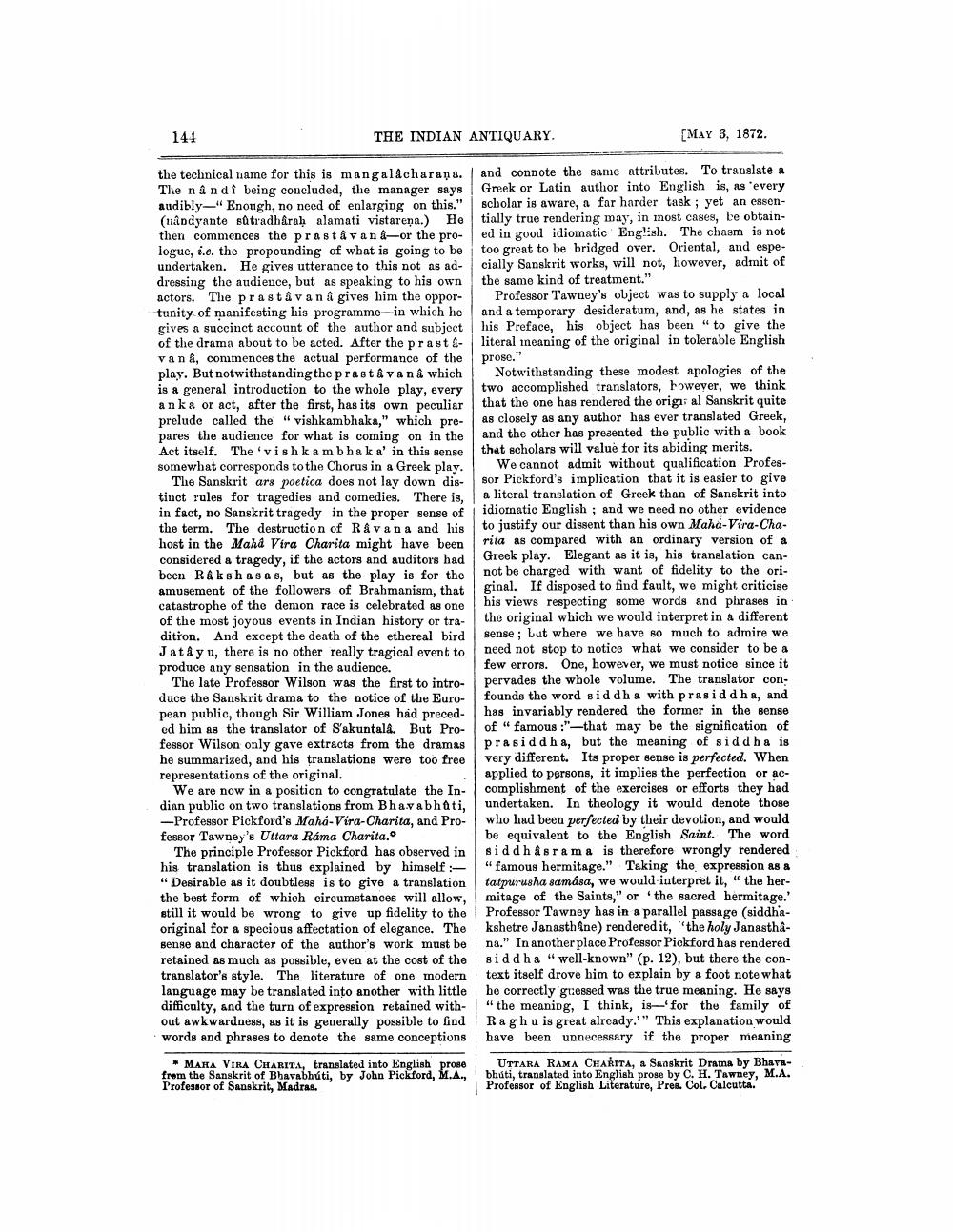________________
141
THE INDIAN ANTIQUARY.
[MAY 3, 1872.
the technical name for this is mangalacharana. | and connote the same attributes. To translate a The nandi being concluded, the manager says | Greek or Latin author into English is, as 'every audibly-"Enough, no need of enlarging on this." | scholar is aware, a far harder task ; yet an essen(nandyante stradhrah alamati vistarena.) Hetially true rendering may, in most cases, be obtainthen commences the prastavan &-or the pro- ed in good idiomatic English. The chasm is not logue, i.e. tho propounding of what is going to be too great to be bridged over. Oriental, and espeundertaken. He gives utterance to this not as ad- cially Sanskrit works, will not, however, admit of dressing the audience, but as speaking to his own the same kind of treatment." actors. The prasta van a gives him the oppor Professor Tawney's object was to supply a local tunity of manifesting his programme-in which he and a temporary desideratum, and, as he states in gives a succinct account of the author and subject his Preface, his object has been" to give the of the drama about to be acted. After the prasta- literal ineaning of the original in tolerable English vana, commences the actual performance of the prose." play. But notwithstanding the prastavan & which Notwithstanding these modest apologies of the is a general introduction to the whole play, every two accomplished translators, however, we think anka or act, after the first, has its own peculiar that the one has rendered the origis al Sanskrit quite prelude called the "vishkambhaka," which pre- as closely as any author has ever translated Greek, pares the audience for what is coming on in the land the other has presented the public with a book Act itself. The 'vish kam bhak a' in this sense that scholars will value for its abiding merits. somewhat corresponds to the Chorus in a Greek play. We cannot admit without qualification Profes
The Sanskrit ars poetica does not lay down dis- sor Pickford's implication that it is easier to give tinct rules for tragedies and comedies. There is a literal translation of Greek than of Sanskrit into in fact, no Sanskrit tragedy in the proper sense of idiomatic English; and we need no other evidence the term. The destruction of RAVana and his to justify our dissent than his own Maha-Vira-Chahost in the Maha Vira Charita might have been
rita as compared with an ordinary version of a considered a tragedy, if the actors and auditors had Greek play. Elegant as it 18, his translation canbeen R&kshas & s, but as the play is for the
not be charged with want of fidelity to the oriamusement of the followers of Brahmanism, that
ginal. If disposed to find fault, we might criticise catastrophe of the demon race is celebrated as one
his views respecting some words and phrases in of the most joyous events in Indian history or tra
the original which we would interpret in a different dition. And except the death of the ethereal bird sense ; but where we have so much to admire we Jatayu, there is no other really tragical event to need not stop to notice what we consider to be a produce any sensation in the audience.
few errors. One, however, we must notice since it The late Professor Wilson was the first to intro- pervades the whole volume. The translator con duce the Sanskrit drama to the notice of the Euro- founds the word siddha with prasiddha, and pean public, though Sir William Jones had preced- has invariably rendered the former in the sense ed him as the translator of Sakuntala. But Pro
of "famous :"-that may be the signification of fessor Wilson only gave extracts from the dramas prasiddha, but the meaning of siddha is he summarized, and his translations were too free very different. Its proper sense is perfected. When representations of the original.
applied to persons, it implies the perfection or acWe are now in a position to congratulate the In- complishment of the exercises or efforts they had dian public on two translations from Bhavabhati, undertaken. In theology it would denote those
-Professor Pickford's Mahá-Vira-Charita, and Pro- who had been perfected by their devotion, and would fessor Tawney's Uttara Ráma Charita.
be equivalent to the English Saint. The word The principle Professor Pickford has observed in siddhasrama is therefore wrongly rendered his translation is thus explained by himself "famous hermitage." Taking the expression as a "Desirable as it doubtless is to give a translation tatpurusha samása, we would interpret it," the herthe best form of which circumstances will allow, mitage of the Saints," or "the sacred hermitage.' still it would be wrong to give up fidelity to the Professor Tawney has in a parallel passage (siddhaoriginal for a specious affectation of elegance. The kshetre Janasthine) rendered it, "the holy Janasthasense and character of the author's work must be na." In another place Professor Pickford has rendered retained as much as possible, even at the cost of the siddha " well-known" (p. 12), but there the contranslator's style. The literature of one modern text itself drove him to explain by a foot note what language may be translated into another with little be correctly guessed was the true meaning. He says difficulty, and the turn of expression retained with- "the meaning, I think, is for the family of out awkwardness, as it is generally possible to find Ragh u is great already."" This explanation would words and phrases to denote the same conceptions have been unnecessary if the proper meaning
* MAHA VIRA CHARITA, translated into English prose from the Sanskrit of Bhavabhúti, by John Pickford, M.A. I'rofessor of Sanskrit, Madras.
UTTARA RAMA CHARITA, a Sanskrit Drama by Bhavabháti, translated into English prose by C. H. Tawney, M.A. Professor of English Literature, Pres. Col. Calcutta.




